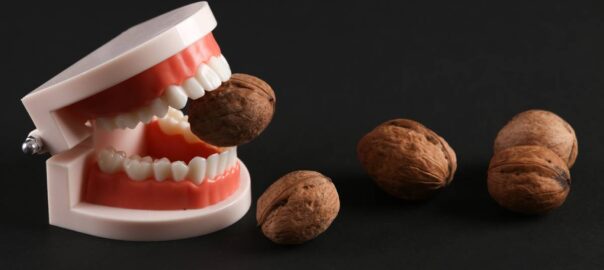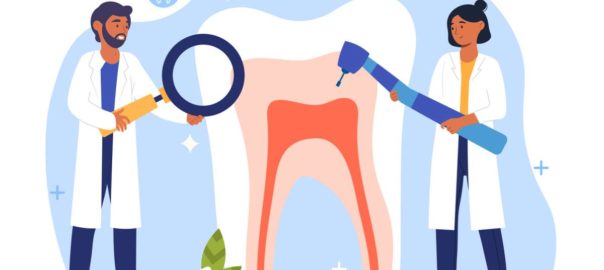When a tooth is chipped or broken, it is not only an aesthetic problem. In fact, this can lead to functional issues, further tooth decay, and even tooth loss if not treated. That is why a damaged tooth requires immediate attention and emergency dental care. In this article, we will talk about the options for repairing a chipped or broken tooth.
First Steps if Your Tooth Is Broken or Chipped
Of course, the first step is to make an appointment at a clinic that has emergency dental services. While you are waiting for your appointment, try doing the following:
- Preserve a piece of your tooth that broke off—it might be possible to use it for restoration.
- Rinse your mouth with salt water to eliminate the bacteria and prevent inflammation.
- If you have to eat, chew on the other side of your mouth and opt for soft or liquid foods to eliminate the possibility of damaging the tooth further
- Be careful if the broken tooth edges are sharp—they might damage the surrounding soft tissue in your mouth. You can place a sugarless gum over it.
- If you feel acute pain, take over-the-counter painkillers, for example, Ibuprofen.
- If your tooth is knocked out of its socket completely, you should act quickly. Make sure that the tooth is clean by rinsing it with water or milk. Do not try to dry it with any materials. Then, try putting your tooth back in its socket. It will increase the chances of its survival. If you can not put it back in the socket, put it in milk or water within 5 minutes after it was knocked out and try to see a dentist within the first 30-60 minutes after the trauma.
Repairing a Chipped or Broken Tooth
When you finally see your dentist, they might suggest different options for restoration, depending on the severity of the case.
Dental Filling or Bonding
In cases when a small piece of enamel is chipped, the tooth can be repaired with dental filling. If a front tooth is damaged, then dental bonding can be a more suitable option. A tooth-colored composite resin is typically used for the procedure of bonding. The procedure of dental bonding is usually painless. Firstly, the surface of the tooth will be prepared by making it rougher so the bonding material can adhere better. Then, the resin will be applied with the help of a special adhesive material. The resin will be shaped like your natural tooth and then hardened with an ultraviolet light.
Dental Crowns
If a larger piece of a tooth breaks off, a dental crown can be the right solution for the problem. Your doctor will help you choose a material for your crown. Then, the tooth will be prepared by filing down its enamel, after which the crown will be placed to cover the tooth completely. Dental crowns are used to support the damaged tooth structure, prevent it from further damage, and improve the tooth’s appearance. If you choose a porcelain, porcelain-fused-to-metal, resin, or ceramic crown, it will most likely be indistinguishable from your natural teeth.
In cases when the entire tooth is broken off at a gum line, but the root still remains in the socket, you might require root canal therapy. A metal post can be placed in the canal to support a dental crown that will be put on top of it. Root canal therapy is also used if the pulp of the tooth is exposed due to the damage. The dead or infected parts of the pulp will be removed, and the root canal will be cleaned and sealed to avoid infections in the future.
Dental Veneers
Dental veneers are an especially great option for restoring chipped or broken front teeth. Veneer is a thin porcelain shell that covers the front of the tooth and looks exactly like your natural teeth. It can effectively mask any cosmetic imperfections of your teeth. Dental veneers can also be used to adjust the shape, size, and color of your teeth. One thing to note is that receiving veneers involves filing down the enamel of the tooth, thus this procedure is considered irreversible.
Make an Appointment Today
If you had a dental trauma resulting in a chipped or broken tooth, do not postpone a visit to a dental office. Call Samaritan Dental today, and we will sign you up for an appointment with an emergency services dentist. Our specialists will make sure that your tooth is repaired and your dental health is preserved. We are looking forward to welcoming you to our office.












 Yelp
Yelp I have never had a better dental experience prior to my visit with Dr. Zabolian. It was pain free for the first time ever, the staff was friendly, accommodating to my schedule, there were no problems with my insurance claims... I am so happy I have found a dentist (after all these years) I feel so comfortable going to and also taking my family.
I have never had a better dental experience prior to my visit with Dr. Zabolian. It was pain free for the first time ever, the staff was friendly, accommodating to my schedule, there were no problems with my insurance claims... I am so happy I have found a dentist (after all these years) I feel so comfortable going to and also taking my family. 






